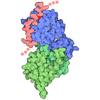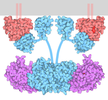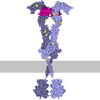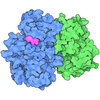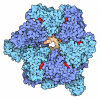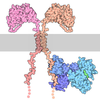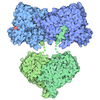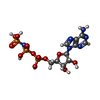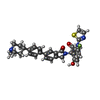[English] 日本語
 Yorodumi
Yorodumi- PDB-7k1i: EGFR kinase (L858R/V948R) in complex with allosteric inhibitor JB... -
+ Open data
Open data
- Basic information
Basic information
| Entry | Database: PDB / ID: 7k1i | |||||||||
|---|---|---|---|---|---|---|---|---|---|---|
| Title | EGFR kinase (L858R/V948R) in complex with allosteric inhibitor JBJ-09-063 | |||||||||
 Components Components | Epidermal growth factor receptor | |||||||||
 Keywords Keywords | TRANSFERASE/TRANSFERASE Inhibitor / EGFR /  ErbB1 / ErbB1 /  kinase / kinase /  inhibitor / inhibitor /  TRANSFERASE / TRANSFERASE-TRANSFERASE Inhibitor complex TRANSFERASE / TRANSFERASE-TRANSFERASE Inhibitor complex | |||||||||
| Function / homology |  Function and homology information Function and homology informationresponse to hydroxyisoflavone /  multivesicular body, internal vesicle lumen / positive regulation of prolactin secretion / negative regulation of cardiocyte differentiation / positive regulation of protein kinase C activity / diterpenoid metabolic process / Shc-EGFR complex / multivesicular body, internal vesicle lumen / positive regulation of prolactin secretion / negative regulation of cardiocyte differentiation / positive regulation of protein kinase C activity / diterpenoid metabolic process / Shc-EGFR complex /  ovulation cycle / Inhibition of Signaling by Overexpressed EGFR / ovulation cycle / Inhibition of Signaling by Overexpressed EGFR /  epidermal growth factor receptor activity ...response to hydroxyisoflavone / epidermal growth factor receptor activity ...response to hydroxyisoflavone /  multivesicular body, internal vesicle lumen / positive regulation of prolactin secretion / negative regulation of cardiocyte differentiation / positive regulation of protein kinase C activity / diterpenoid metabolic process / Shc-EGFR complex / multivesicular body, internal vesicle lumen / positive regulation of prolactin secretion / negative regulation of cardiocyte differentiation / positive regulation of protein kinase C activity / diterpenoid metabolic process / Shc-EGFR complex /  ovulation cycle / Inhibition of Signaling by Overexpressed EGFR / ovulation cycle / Inhibition of Signaling by Overexpressed EGFR /  epidermal growth factor receptor activity / EGFR interacts with phospholipase C-gamma / positive regulation of mucus secretion / response to UV-A / epidermal growth factor receptor activity / EGFR interacts with phospholipase C-gamma / positive regulation of mucus secretion / response to UV-A /  epidermal growth factor binding / PLCG1 events in ERBB2 signaling / tongue development / midgut development / ERBB2-EGFR signaling pathway / hydrogen peroxide metabolic process / PTK6 promotes HIF1A stabilization / digestive tract morphogenesis / epidermal growth factor binding / PLCG1 events in ERBB2 signaling / tongue development / midgut development / ERBB2-EGFR signaling pathway / hydrogen peroxide metabolic process / PTK6 promotes HIF1A stabilization / digestive tract morphogenesis /  regulation of nitric-oxide synthase activity / morphogenesis of an epithelial fold / ERBB2 Activates PTK6 Signaling / intracellular vesicle / Signaling by EGFR / response to cobalamin / regulation of nitric-oxide synthase activity / morphogenesis of an epithelial fold / ERBB2 Activates PTK6 Signaling / intracellular vesicle / Signaling by EGFR / response to cobalamin /  transmembrane receptor protein tyrosine kinase activator activity / protein tyrosine kinase activator activity / negative regulation of epidermal growth factor receptor signaling pathway / Signaling by ERBB4 / regulation of phosphatidylinositol 3-kinase/protein kinase B signal transduction / eyelid development in camera-type eye / protein insertion into membrane / cerebral cortex cell migration / ERBB2 Regulates Cell Motility / regulation of JNK cascade / : / PI3K events in ERBB2 signaling / positive regulation of cyclin-dependent protein serine/threonine kinase activity / negative regulation of mitotic cell cycle / hair follicle development / transmembrane receptor protein tyrosine kinase activator activity / protein tyrosine kinase activator activity / negative regulation of epidermal growth factor receptor signaling pathway / Signaling by ERBB4 / regulation of phosphatidylinositol 3-kinase/protein kinase B signal transduction / eyelid development in camera-type eye / protein insertion into membrane / cerebral cortex cell migration / ERBB2 Regulates Cell Motility / regulation of JNK cascade / : / PI3K events in ERBB2 signaling / positive regulation of cyclin-dependent protein serine/threonine kinase activity / negative regulation of mitotic cell cycle / hair follicle development /  MAP kinase kinase kinase activity / Estrogen-dependent nuclear events downstream of ESR-membrane signaling / embryonic placenta development / positive regulation of bone resorption / positive regulation of G1/S transition of mitotic cell cycle / GAB1 signalosome / positive regulation of nitric oxide mediated signal transduction / salivary gland morphogenesis / peptidyl-tyrosine autophosphorylation / regulation of peptidyl-tyrosine phosphorylation / positive regulation of phosphorylation / positive regulation of glial cell proliferation / positive regulation of vasoconstriction / Signaling by ERBB2 / cellular response to epidermal growth factor stimulus / cellular response to cadmium ion / GRB2 events in EGFR signaling / SHC1 events in EGFR signaling / positive regulation of DNA repair / EGFR Transactivation by Gastrin / GRB2 events in ERBB2 signaling / TFAP2 (AP-2) family regulates transcription of growth factors and their receptors / MAP kinase kinase kinase activity / Estrogen-dependent nuclear events downstream of ESR-membrane signaling / embryonic placenta development / positive regulation of bone resorption / positive regulation of G1/S transition of mitotic cell cycle / GAB1 signalosome / positive regulation of nitric oxide mediated signal transduction / salivary gland morphogenesis / peptidyl-tyrosine autophosphorylation / regulation of peptidyl-tyrosine phosphorylation / positive regulation of phosphorylation / positive regulation of glial cell proliferation / positive regulation of vasoconstriction / Signaling by ERBB2 / cellular response to epidermal growth factor stimulus / cellular response to cadmium ion / GRB2 events in EGFR signaling / SHC1 events in EGFR signaling / positive regulation of DNA repair / EGFR Transactivation by Gastrin / GRB2 events in ERBB2 signaling / TFAP2 (AP-2) family regulates transcription of growth factors and their receptors /  transmembrane receptor protein tyrosine kinase activity / SHC1 events in ERBB2 signaling / transmembrane receptor protein tyrosine kinase activity / SHC1 events in ERBB2 signaling /  ossification / positive regulation of synaptic transmission, glutamatergic / ossification / positive regulation of synaptic transmission, glutamatergic /  neurogenesis / cellular response to dexamethasone stimulus / basal plasma membrane / regulation of ERK1 and ERK2 cascade / neuron projection morphogenesis / positive regulation of superoxide anion generation / positive regulation of DNA replication / Signal transduction by L1 / epithelial cell proliferation / cellular response to estradiol stimulus / NOTCH3 Activation and Transmission of Signal to the Nucleus / positive regulation of epithelial cell proliferation / astrocyte activation / neurogenesis / cellular response to dexamethasone stimulus / basal plasma membrane / regulation of ERK1 and ERK2 cascade / neuron projection morphogenesis / positive regulation of superoxide anion generation / positive regulation of DNA replication / Signal transduction by L1 / epithelial cell proliferation / cellular response to estradiol stimulus / NOTCH3 Activation and Transmission of Signal to the Nucleus / positive regulation of epithelial cell proliferation / astrocyte activation /  liver regeneration / positive regulation of protein localization to plasma membrane / EGFR downregulation / liver regeneration / positive regulation of protein localization to plasma membrane / EGFR downregulation /  cell surface receptor protein tyrosine kinase signaling pathway / cellular response to amino acid stimulus / positive regulation of smooth muscle cell proliferation / Signaling by ERBB2 TMD/JMD mutants / positive regulation of MAP kinase activity / clathrin-coated endocytic vesicle membrane / lung development / Constitutive Signaling by EGFRvIII / Signaling by ERBB2 ECD mutants / epidermal growth factor receptor signaling pathway / Signaling by ERBB2 KD Mutants / negative regulation of protein catabolic process / cell surface receptor protein tyrosine kinase signaling pathway / cellular response to amino acid stimulus / positive regulation of smooth muscle cell proliferation / Signaling by ERBB2 TMD/JMD mutants / positive regulation of MAP kinase activity / clathrin-coated endocytic vesicle membrane / lung development / Constitutive Signaling by EGFRvIII / Signaling by ERBB2 ECD mutants / epidermal growth factor receptor signaling pathway / Signaling by ERBB2 KD Mutants / negative regulation of protein catabolic process /  receptor protein-tyrosine kinase / Downregulation of ERBB2 signaling / receptor protein-tyrosine kinase / Downregulation of ERBB2 signaling /  kinase binding / ruffle membrane kinase binding / ruffle membraneSimilarity search - Function | |||||||||
| Biological species |   Homo sapiens (human) Homo sapiens (human) | |||||||||
| Method |  X-RAY DIFFRACTION / X-RAY DIFFRACTION /  SYNCHROTRON / SYNCHROTRON /  MOLECULAR REPLACEMENT / Resolution: 3.202 Å MOLECULAR REPLACEMENT / Resolution: 3.202 Å | |||||||||
 Authors Authors | Beyett, T.S. / Eck, M.J. | |||||||||
| Funding support |  United States, 2items United States, 2items
| |||||||||
 Citation Citation |  Journal: Nat Commun / Year: 2022 Journal: Nat Commun / Year: 2022Title: Molecular basis for cooperative binding and synergy of ATP-site and allosteric EGFR inhibitors Authors: Beyett, T.S. / To, C. / Heppner, D.E. / Rana, J.K. / Schmoker, A.M. / Jang, J. / De Clercq, D.J.H. / Gomez, G. / Scott, D.A. / Gray, N.S. / Janne, P.A. / Eck, M.J. | |||||||||
| History |
|
- Structure visualization
Structure visualization
| Structure viewer | Molecule:  Molmil Molmil Jmol/JSmol Jmol/JSmol |
|---|
- Downloads & links
Downloads & links
- Download
Download
| PDBx/mmCIF format |  7k1i.cif.gz 7k1i.cif.gz | 144.4 KB | Display |  PDBx/mmCIF format PDBx/mmCIF format |
|---|---|---|---|---|
| PDB format |  pdb7k1i.ent.gz pdb7k1i.ent.gz | 110.1 KB | Display |  PDB format PDB format |
| PDBx/mmJSON format |  7k1i.json.gz 7k1i.json.gz | Tree view |  PDBx/mmJSON format PDBx/mmJSON format | |
| Others |  Other downloads Other downloads |
-Validation report
| Arichive directory |  https://data.pdbj.org/pub/pdb/validation_reports/k1/7k1i https://data.pdbj.org/pub/pdb/validation_reports/k1/7k1i ftp://data.pdbj.org/pub/pdb/validation_reports/k1/7k1i ftp://data.pdbj.org/pub/pdb/validation_reports/k1/7k1i | HTTPS FTP |
|---|
-Related structure data
| Related structure data | 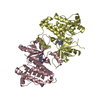 7jxiC 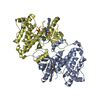 7jxkC 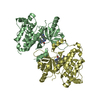 7jxlC 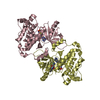 7jxmC 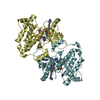 7jxpC 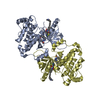 7jxwC 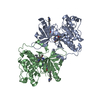 7k1hC 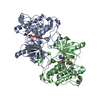 5d41S S: Starting model for refinement C: citing same article ( |
|---|---|
| Similar structure data |
- Links
Links
- Assembly
Assembly
| Deposited unit | 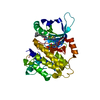
| ||||||||
|---|---|---|---|---|---|---|---|---|---|
| 1 | 
| ||||||||
| Unit cell |
|
- Components
Components
| #1: Protein |  / Proto-oncogene c-ErbB-1 / Receptor tyrosine-protein kinase erbB-1 / Proto-oncogene c-ErbB-1 / Receptor tyrosine-protein kinase erbB-1Mass: 37738.539 Da / Num. of mol.: 1 / Fragment: kinase domain / Mutation: L858R, V948R Source method: isolated from a genetically manipulated source Source: (gene. exp.)   Homo sapiens (human) / Gene: EGFR, ERBB, ERBB1, HER1 / Plasmid: pTriEX / Cell line (production host): Sf9 / Production host: Homo sapiens (human) / Gene: EGFR, ERBB, ERBB1, HER1 / Plasmid: pTriEX / Cell line (production host): Sf9 / Production host:   Spodoptera frugiperda (fall armyworm) Spodoptera frugiperda (fall armyworm)References: UniProt: P00533,  receptor protein-tyrosine kinase receptor protein-tyrosine kinase |
|---|---|
| #2: Chemical | ChemComp-MG / |
| #3: Chemical | ChemComp-ANP / |
| #4: Chemical | ChemComp-VNS / ( |
| Has ligand of interest | Y |
-Experimental details
-Experiment
| Experiment | Method:  X-RAY DIFFRACTION / Number of used crystals: 1 X-RAY DIFFRACTION / Number of used crystals: 1 |
|---|
- Sample preparation
Sample preparation
| Crystal | Density Matthews: 1.89 Å3/Da / Density % sol: 35.04 % / Mosaicity: 0 ° |
|---|---|
Crystal grow | Temperature: 293 K / Method: vapor diffusion, hanging drop / pH: 5.5 / Details: 0.1 M Bis-Tris pH 5.5, 28% (w/v) PEG 3350 |
-Data collection
| Diffraction | Mean temperature: 100 K / Serial crystal experiment: N | |||||||||||||||||||||||||||
|---|---|---|---|---|---|---|---|---|---|---|---|---|---|---|---|---|---|---|---|---|---|---|---|---|---|---|---|---|
| Diffraction source | Source:  SYNCHROTRON / Site: SYNCHROTRON / Site:  APS APS  / Beamline: 24-ID-E / Wavelength: 0.9792 Å / Beamline: 24-ID-E / Wavelength: 0.9792 Å | |||||||||||||||||||||||||||
| Detector | Type: DECTRIS EIGER X 16M / Detector: PIXEL / Date: Dec 5, 2018 | |||||||||||||||||||||||||||
| Radiation | Monochromator: Double Crystal / Protocol: SINGLE WAVELENGTH / Monochromatic (M) / Laue (L): M / Scattering type: x-ray | |||||||||||||||||||||||||||
| Radiation wavelength | Wavelength : 0.9792 Å / Relative weight: 1 : 0.9792 Å / Relative weight: 1 | |||||||||||||||||||||||||||
| Reflection | Resolution: 3.2→53.94 Å / Num. obs: 4805 / % possible obs: 98.8 % / Redundancy: 6.5 % / Biso Wilson estimate: 114.45 Å2 / CC1/2: 0.994 / Rmerge(I) obs: 0.144 / Rpim(I) all: 0.062 / Rrim(I) all: 0.158 / Net I/σ(I): 7.2 / Num. measured all: 31390 / Scaling rejects: 27 | |||||||||||||||||||||||||||
| Reflection shell | Diffraction-ID: 1 / Redundancy: 5.8 %
|
- Processing
Processing
| Software |
| ||||||||||||||||||||||||||||||||||||||||
|---|---|---|---|---|---|---|---|---|---|---|---|---|---|---|---|---|---|---|---|---|---|---|---|---|---|---|---|---|---|---|---|---|---|---|---|---|---|---|---|---|---|
| Refinement | Method to determine structure : :  MOLECULAR REPLACEMENT MOLECULAR REPLACEMENTStarting model: 5D41 Resolution: 3.202→53.936 Å / SU ML: 0.39 / Cross valid method: THROUGHOUT / σ(F): 1.38 / Phase error: 29.51 / Stereochemistry target values: ML
| ||||||||||||||||||||||||||||||||||||||||
| Solvent computation | Shrinkage radii: 0.9 Å / VDW probe radii: 1.11 Å / Solvent model: FLAT BULK SOLVENT MODEL | ||||||||||||||||||||||||||||||||||||||||
| Displacement parameters | Biso max: 365.42 Å2 / Biso mean: 153.8804 Å2 / Biso min: 30 Å2 | ||||||||||||||||||||||||||||||||||||||||
| Refinement step | Cycle: final / Resolution: 3.202→53.936 Å
| ||||||||||||||||||||||||||||||||||||||||
| Refine LS restraints |
| ||||||||||||||||||||||||||||||||||||||||
| LS refinement shell | Refine-ID: X-RAY DIFFRACTION / Rfactor Rfree error: 0
| ||||||||||||||||||||||||||||||||||||||||
| Refinement TLS params. | Method: refined / Origin x: 17.3615 Å / Origin y: -14.9412 Å / Origin z: 8.3435 Å
| ||||||||||||||||||||||||||||||||||||||||
| Refinement TLS group | Selection details: (chain 'A' and resid 700 through 1007) |
 Movie
Movie Controller
Controller


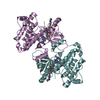
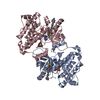
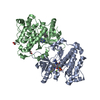
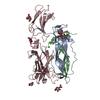
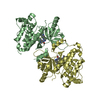
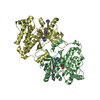
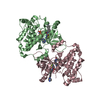
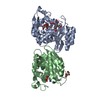
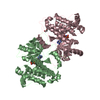
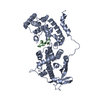
 PDBj
PDBj


